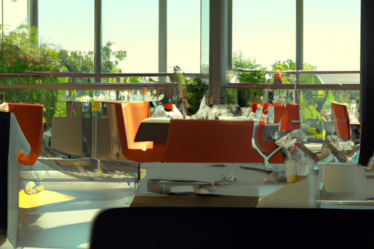
Impact of COVID-19 on Hotel Transactions in Q2
The second quarter of 2020 has been a challenging time for the hotel industry. The impact of the COVID-19 pandemic has been felt across the globe, with travel restrictions and lockdown measures severely affecting hotel transactions. In this article, we will take a closer look at the decline in hotel transactions during this period and explore the reasons behind it.
The decline in hotel transactions during Q2 can be attributed to several factors. Firstly, the widespread travel restrictions imposed by governments around the world have significantly reduced the number of people traveling for both business and leisure purposes. With fewer travelers, hotels have experienced a sharp decline in occupancy rates, resulting in a decrease in demand for hotel properties.
Furthermore, the fear and uncertainty surrounding the pandemic have also played a role in the decline of hotel transactions. Many potential buyers and investors are hesitant to make significant financial commitments during such uncertain times. The economic impact of the pandemic has also led to a decrease in disposable income for many individuals, making it difficult for them to consider purchasing hotel properties.
Another factor contributing to the decline in hotel transactions is the lack of financing options available. With the economic downturn caused by the pandemic, banks and financial institutions have become more cautious in lending money for hotel acquisitions. This has made it challenging for potential buyers to secure the necessary funds to complete transactions.
The decline in hotel transactions has not been uniform across all regions. Some areas have been hit harder than others, depending on the severity of the outbreak and the effectiveness of containment measures. For example, popular tourist destinations that heavily rely on international travelers have experienced a more significant decline in hotel transactions compared to regions with a stronger domestic tourism market.
Despite the challenges faced by the hotel industry, there is hope for recovery in the future. As countries gradually ease travel restrictions and the development of effective vaccines progresses, the demand for hotel properties is expected to rebound. The pent-up demand for travel and tourism is likely to drive an increase in hotel transactions once the situation stabilizes.
In the meantime, hotel owners and operators are adapting to the new normal by implementing stringent health and safety protocols to ensure the well-being of their guests. This includes enhanced cleaning and sanitization measures, social distancing guidelines, and contactless check-in and check-out processes. These measures are crucial in rebuilding consumer confidence and attracting guests back to hotels.
In conclusion, the second quarter of 2020 has seen a significant decline in hotel transactions due to the impact of the COVID-19 pandemic. Travel restrictions, fear and uncertainty, lack of financing options, and regional variations have all contributed to this decline. However, with the gradual easing of restrictions and the implementation of safety measures, the hotel industry is hopeful for a recovery in the future. It is essential for hotel owners and operators to adapt to the new normal and prioritize the health and safety of their guests to rebuild consumer confidence.
Analyzing the Factors Contributing to the Decline in Hotel Transactions

The second quarter of the year has seen a significant decline in hotel transactions, leaving many industry experts puzzled. In order to understand the factors contributing to this decline, it is important to take a closer look at the current state of the hotel industry and the various challenges it is facing.
One of the main factors impacting hotel transactions is the ongoing COVID-19 pandemic. With travel restrictions and lockdown measures in place, the demand for hotel accommodations has plummeted. Many people are hesitant to travel, and those who do are often opting for alternative accommodations such as vacation rentals or staying with friends and family. This decrease in demand has led to a decrease in hotel occupancy rates, making it less attractive for investors to acquire or sell hotel properties.
Another factor to consider is the economic uncertainty caused by the pandemic. Many businesses have been forced to close or operate at reduced capacity, resulting in a decline in corporate travel. This has had a direct impact on the hotel industry, as business travelers are a significant source of revenue for hotels. Without the steady stream of corporate guests, hotels are struggling to maintain profitability, making it less appealing for investors to enter the market.
Additionally, the rise of online travel agencies and booking platforms has changed the way people book accommodations. With the convenience of these platforms, travelers have more options and can easily compare prices and reviews. This has increased competition among hotels, putting pressure on room rates and profit margins. As a result, investors may be hesitant to acquire or sell hotel properties, as the potential return on investment may not be as lucrative as in the past.
Furthermore, the hotel industry is also facing increased competition from alternative accommodations such as vacation rentals and home-sharing platforms. These options often offer more space and amenities at a lower cost, making them attractive to travelers, especially families or groups. This shift in consumer preferences has impacted the demand for traditional hotel accommodations, further contributing to the decline in hotel transactions.
In order to navigate these challenges and stimulate hotel transactions, industry players need to adapt and innovate. Hotels can focus on implementing enhanced health and safety measures to reassure travelers and regain their trust. They can also explore partnerships with online travel agencies to increase visibility and attract more bookings. Additionally, hotels can consider diversifying their offerings by incorporating elements of vacation rentals, such as larger suites or extended-stay options, to cater to changing consumer preferences.
Overall, the decline in hotel transactions during the second quarter can be attributed to a combination of factors, including the ongoing pandemic, economic uncertainty, increased competition, and changing consumer preferences. While the road to recovery may be challenging, the hotel industry has proven its resilience in the past and will likely find ways to adapt and thrive once again. By understanding these factors and taking proactive measures, hotels can position themselves for success in the post-pandemic world.
Strategies for Hotels to Navigate the Q2 Decline in Transactions
The Q2 decline in hotel transactions has been a cause for concern for many hoteliers. As the hospitality industry continues to grapple with the effects of the COVID-19 pandemic, it is crucial for hotels to develop strategies to navigate this challenging period.
One strategy that hotels can employ is to focus on local and regional markets. With travel restrictions and reduced international travel, targeting local and regional guests can help hotels maintain a steady stream of bookings. By offering attractive packages and promotions to residents in nearby cities or states, hotels can tap into a market that is more likely to be able to travel.
Another strategy is to enhance the guest experience. With fewer bookings, hotels have the opportunity to provide a more personalized and memorable stay for their guests. By going the extra mile in terms of service and amenities, hotels can create a positive impression that will encourage guests to return in the future and recommend the hotel to others.
Hotels can also consider partnering with other businesses in their area. By collaborating with local attractions, restaurants, or event organizers, hotels can create unique experiences for their guests. This not only adds value to the guest’s stay but also helps to support other businesses in the community. By working together, hotels and local businesses can attract more visitors and stimulate the local economy.
In addition, hotels should focus on their online presence and digital marketing efforts. With more people relying on the internet for travel planning, it is essential for hotels to have a strong online presence. This includes having an updated and user-friendly website, active social media accounts, and positive online reviews. By investing in digital marketing strategies such as search engine optimization and targeted advertising, hotels can increase their visibility and attract more potential guests.
Furthermore, hotels should consider offering flexible cancellation policies and attractive booking incentives. With the uncertainty surrounding travel plans, guests are more likely to book with hotels that offer flexible cancellation policies. By providing this reassurance, hotels can alleviate concerns and encourage bookings. Additionally, offering incentives such as discounted rates, complimentary upgrades, or loyalty program perks can entice guests to choose a particular hotel over its competitors.
Lastly, hotels should prioritize health and safety measures. As travelers become more cautious about their health and safety, it is crucial for hotels to implement and communicate rigorous cleaning and sanitization protocols. By demonstrating a commitment to guest well-being, hotels can instill confidence in potential guests and encourage bookings.
In conclusion, the Q2 decline in hotel transactions presents a challenge for the hospitality industry. However, by implementing strategies such as targeting local markets, enhancing the guest experience, partnering with local businesses, focusing on online presence, offering flexible booking policies, and prioritizing health and safety, hotels can navigate this period successfully. By adapting to the current circumstances and being proactive in their approach, hotels can position themselves for a strong recovery in the future.


